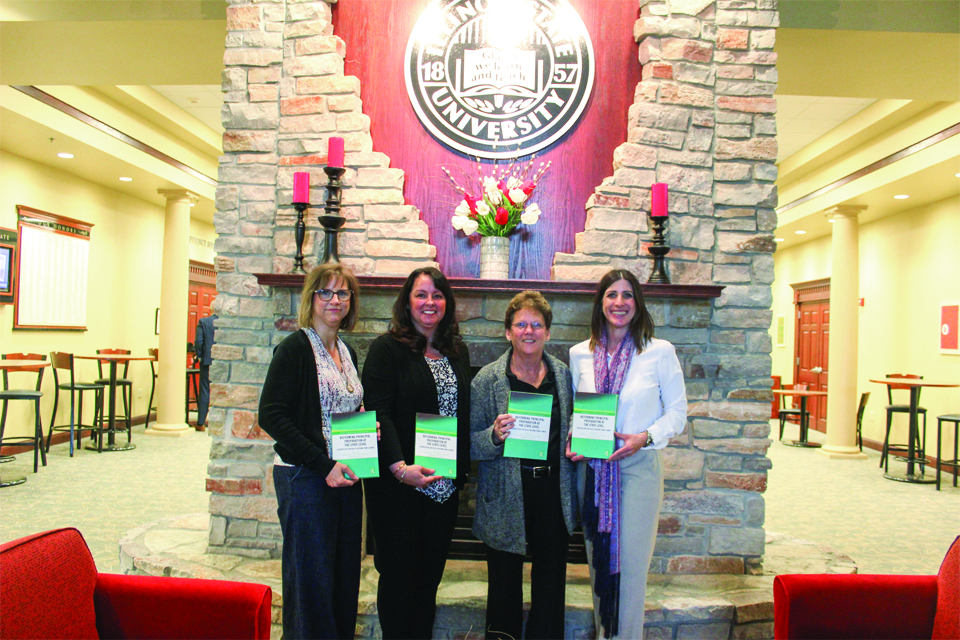Illinois is home to a nationally recognized model for principal preparation reform. A new book by one of the key players in the effort, the Center for the Study of Education Policy (CSEP) at Illinois State University, chronicles the foundation of the hard-earned achievement.
Titled Reforming Principal Preparation at the State Level: Perspectives on Policy Reform from Illinois, the publication illustrates how higher education, P-12 schools, and statewide and community organizations worked together to transform the way principals are prepared.
True to the collaborative nature of this reform, this book features the perspectives of 65 contributors who were involved in the reform process. The foreword was written by former U.S. Secretary of Education and Chicago Public Schools CEO Arne Duncan, who was also involved with and a proponent of the work. The authors tell a story of positive and sustainable change using case studies, vignettes, and sharing tools and artifacts developed during the reform process that can be used by contemporaries in the leadership field.
Steve Tozer, professor emeritus from the nationally acclaimed education leadership program at the University of Illinois at Chicago, was instrumental in the state’s reform work, serving as chairman to two of the state’s task forces documented in the book.
“This volume is both an important resource for states seeking to develop principal preparation as a lever for change and for the historical record,” Tozer said.
“If the current national movement continues, there will be a time when analysts will look back at the period 2000-2025 as a period of significant change in the field of school leadership development in the U.S., just as we now can look back at the period of 1910-20 as the pivot point in medical preparation. This book will be a major historical resource; there’s nothing else like it that I know of.”
The story starts in the early 2000s. At that time, data-driven research was solidifying what many identified as a growing concern for Illinois schools: Weak principal preparation program standards were not producing the school leaders that were meeting the changing needs of students, teachers, and communities.
“Making the case to policymakers on the need for this work in Illinois was a no-brainer,” said CSEP senior analyst Erika Hunt. “School principals act as ‘powerful multipliers of effective teaching and leadership practices in schools,’ impacting teaching and learning not only in single classrooms, but school-wide. Yet, the former standards and preparation programs training them were not resulting in principals who could perform the important roles of retaining and developing teachers, cultivating positive school cultures, and increasing student achievement in the way that staff and students in schools needed.”
CSEP served as a catalyst to unify practitioners and policymakers around the issue. Hunt and fellow policy analysts Alicia Haller, Lisa Hood, and Maureen Kincaid led substantial grants that engaged stakeholders and identified the training standards necessary to develop effective school leadership.
Over the last 15 years, CSEP has secured over $34 million to serve education reform with Illinois schools, most of it directed to support school leadership. External funders include the U.S. Department of Education, The Wallace Foundation, the McCormick Foundation, and the Stone Foundation, among others. Their influence on this work is captured in the content of this book.
The work has key support from critical statewide stakeholder groups such as the Illinois Education Association (IEA) and the Illinois Federation of Teachers (IFT).
“IEA was supportive of this work because we know the success of our teachers depends greatly on the quality of school principals that supervise and support them,” said Audrey Soglin, IEA’s executive director.
“To recruit and retain the best teachers for Illinois schools, it is imperative that we have good principals.”
Diane Rutledge, a former superintendent and recently retired executive director of Large Unit District Association (LUDA), an association of the state’s largest school districts, was instrumental with pushing that the new standards and requirements be viewed from the district perspective.
“You can really see the ‘district as the consumer’ in Illinois’ new principal preparation programs and this book captures how the district’s voice was at the table with co-developing the new standards and requirements guiding these programs,” Rutledge said.
After the passage of Public Act 096-0903, the new, more rigorous standards were required for all principal candidates admitted to university training programs after 2012. The work is paying off and schools are seeing the difference. The bipartisan and statewide collaboration earned the state of Illinois the ECS (Education commission of the States) Frank Newman Award for State Innovation and was presented to the CSEP, the Illinois State Board of Education, and the Illinois Board of Higher Education in 2014.
In 2013, CSEP was awarded a grant by the U.S. Department of Education titled the Illinois Partnerships Advance Rigorous Training (IL-PART) grant, which partnered with four universities to support the implementation of the new program standards and innovative internship practices. This grant created such a huge demand that enrollment is four times what was expected. The result is increased capacity in schools.
With new principal preparation standards in place, CSEP turned its sights on addressing supports to existing school leaders. Continuing with the spirit of partnership, through a Supporting Effective Educator Development (SEED) and an Education Innovation and Research (EIR) grant CSEP is now collaborating with four Regional Offices of Education (ROEs), three universities, and over 150 schools to provide instructional supports to enhance the principals’ abilities and empower teacher leaders in buildings across the state.
Hunt emphasized that the best policy and practice supporting schools occurs when collaboration occurs to create a training program that is rigorous and relevant. Districts, ROEs, and universities are doing the work. “It is bottom-up reform, not top-down thinking,” she said.

